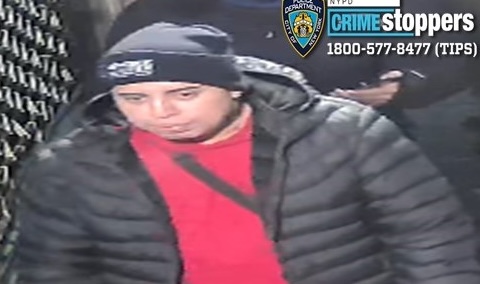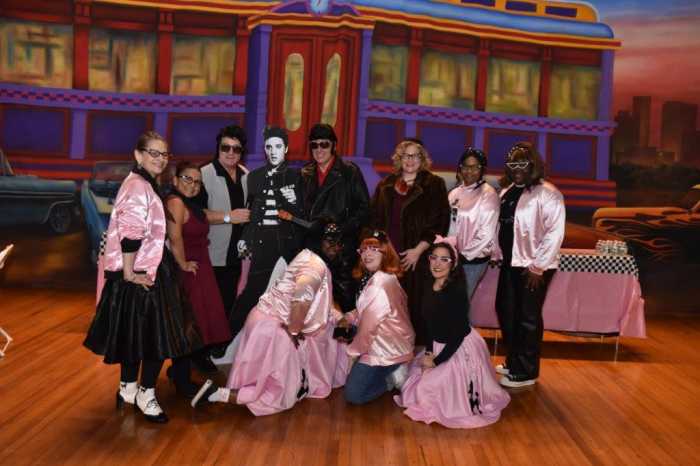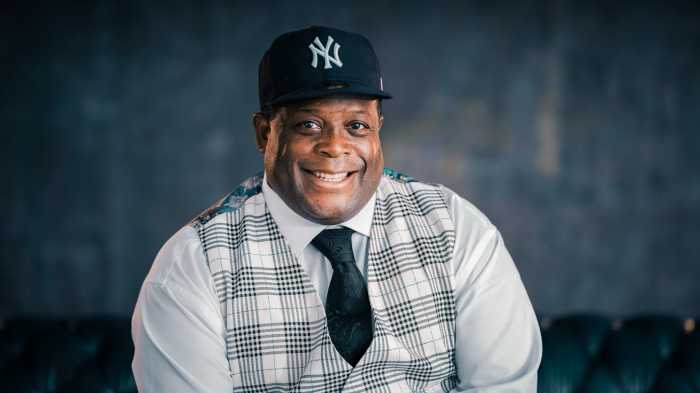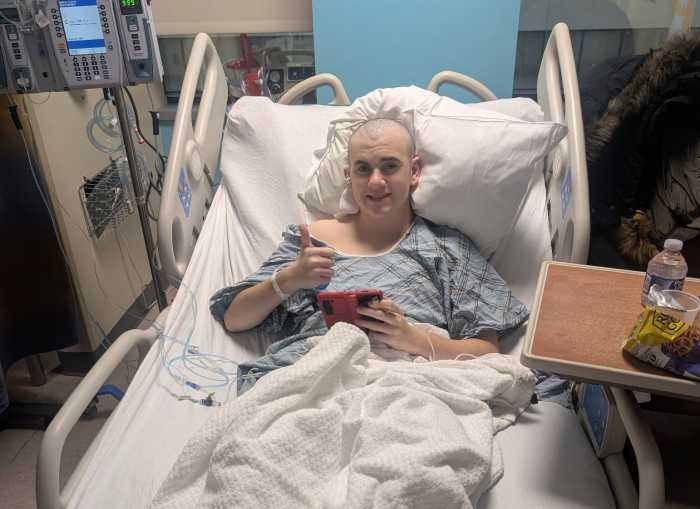Mayor Eric Adams held a town hall meeting in Corona Monday night with residents demanding answers as to how the city plans to address increased prostitution, illegal vending and the proliferation of unlicensed smoke shops in the neighborhood.
More than hundred attendees attended the event in the gymnasium at Elm Tree Elementary School on 98th Street and peppered the mayor with questions primarily dealing with quality-of-life issues. Several questions also dealt with an uptick in homelessness in the parks as well as crime and street flooding.
A hot topic dealt with the prevalence of sex workers, particularly on Roosevelt Avenue, where residents say the blatant display is hard to avoid.
One resident who brought up the issue handed the mayor a pink pamphlet, listing available services, that she says are being distributed along the stretch lined with massage parlors.
Adams noted that he had seen the same pamphlet himself when he made a late-night visit to the area earlier this year with Deputy Mayor Philip Banks.
The mayor said that steps have been taken to address the problem, noting the NYPD had taken action. For instance, officials identified 40 locations after he visited the area where prostitution was being conducted and sent officers to conduct undercover operations. Officers visited 20 locations, conducted buys and handed over the video surveillance and other evidence to the Queens District Attorney’s office. Banks, who was at the meeting, said that 18 of those locations were submitted for nuisance abatement and will likely be shut down sometime in January.
The NYPD, while targeting the locations, also hit the property owners with summonses dealing with Department of Buildings and FDNY violations to increase the likelihood of shutting down the establishments.
But Adams partly blamed the federal government for the worsening of the issue, which coincided with an influx of migrants arriving in the city. The mayor added that President Biden had largely ignored his call to issue work permits to the new arrivals.
“That’s a byproduct of bringing people in a country and telling them they can’t work. When you can’t work, you’re exploited,” said Adams in response to a rise in sex work in Queens. “Many people are forced into sexual exploitation because you’re told you can’t work.”
But Council Member Francisco Moya, who represents Corona and was at the meeting, agreed with locals, noting the issue is real and more needs to be done to address the problem.
“There’s a serious issue on Roosevelt Avenue with prostitution. It’s a significant issue that’s affecting the quality of life. We get daily complaints from business owners, residents, church members and schools,” Moya said. “No parent should have to walk their child to school seeing the display.”
The council member suggested going after the property owners that are renting out to massage parlors where illegal sex work occurs, as well as coordinating with organizations knowledgeable about sex trafficking to support the workers.
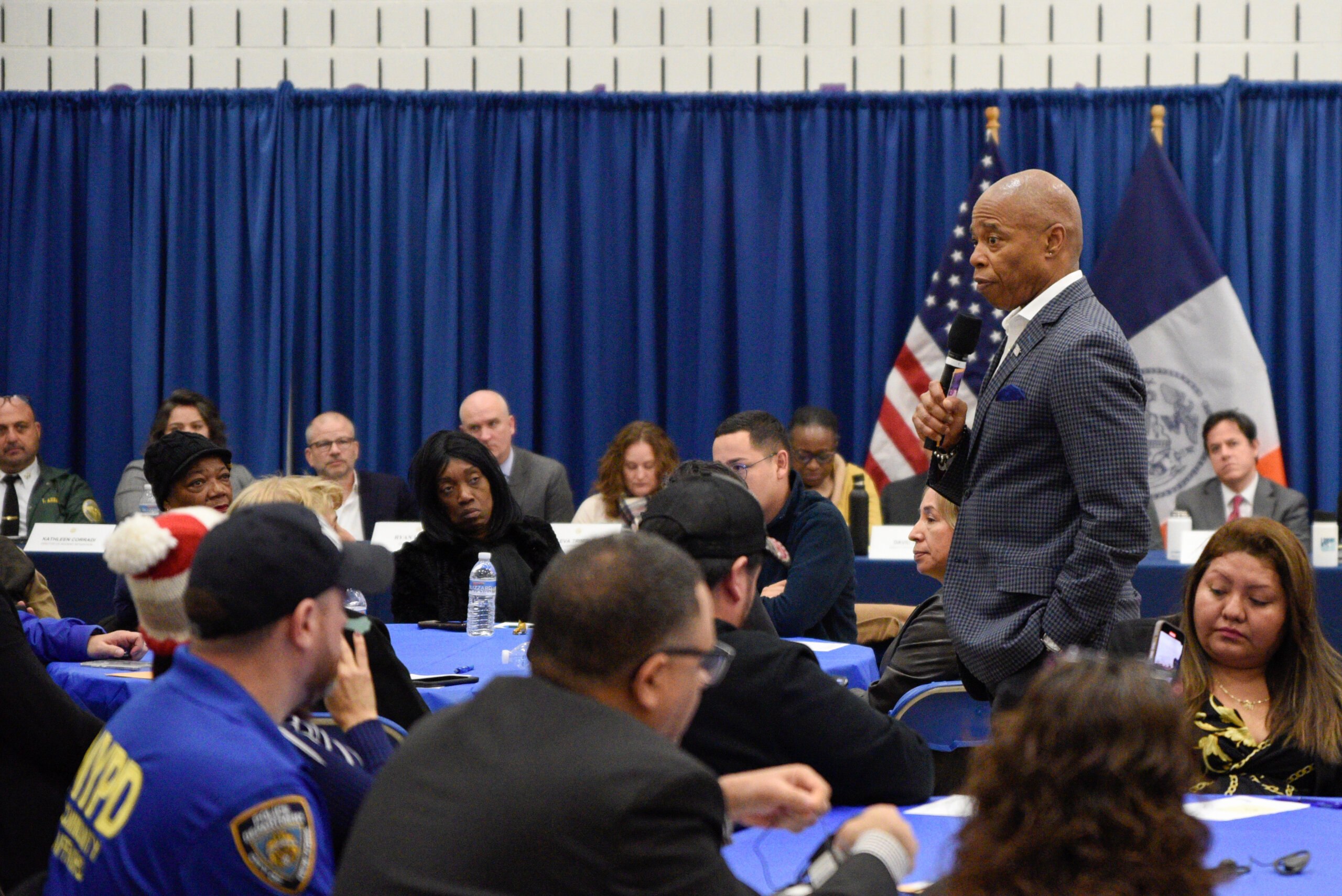
Cracking Down on Smoke Shops
The abundance of illegal smoke shops popping up in Corona was also a complaint voiced at the meeting. But the Mayor said that it is largely a state issue that is not fully in the city’s jurisdiction.
“Right now the state has the enforcement power, and the state does not have the manpower to do the enforcement,” said Adams.
Assemblymember Jenifer Rajkumar, who represents a part of south Queens and is a key ally of the Mayor, announced at the town hall that she plans to introduce a bill to expand the city’s power to shut down unlicensed smoke shops.
“Unlicensed illegal smoke shops are endangering the children of our community, and they are hotbeds of crime,” said Rajkumar. “In my district people have been shot and died at these shops.”
With the legalization and decriminalization of marijuana in the state, city officials have limited power and authority to enforce the rise in illegal smoke shops. The city’s sheriff’s office, however, has conducted some raids and managed to close some of smoke shops down.
But attendees at the meeting were calling for more action. One Department of Education employee said that she and other DOE employees have had experiences where students ingested cannabis edibles in their schools, leading to emergencies.
They attributed the incidents to the prevalence of illegal smoke shops, which sell unregulated cannabis products to underage customers.
Street Vendors Evicted, Now What?
The mayor shot back at critics who denounced him for removing unlicensed street vendors from Corona Plaza this summer.
“I believe in public safety. I believe in decency. I believe people should respect you and not do whatever they want on your block and in front of your house,” said the Mayor to a round of applause from the room.
Months after the mass eviction conducted by the Department of Sanitation police, only a dozen vendors have been permitted to return, with their hours capped. However, many of the vendors who were kicked out have begun setting up in front of residential homes.
“When we clean up Corona Plaza, it gets pushed out to the residential side streets. And this is what’s become a very pervasive problem throughout the entire district here,” said Council Member Moya.
Moya said that vendors are blocking sidewalks, using driveways and setting up directly in front of homes they do not live in, leading to disputes between vendors and homeowners.
Advocates in support of the vendors say that the permitting process for acquiring a license is nearly impossible, with thousands on a waitlist that isn’t moving due to an arbitrary cap on licenses.
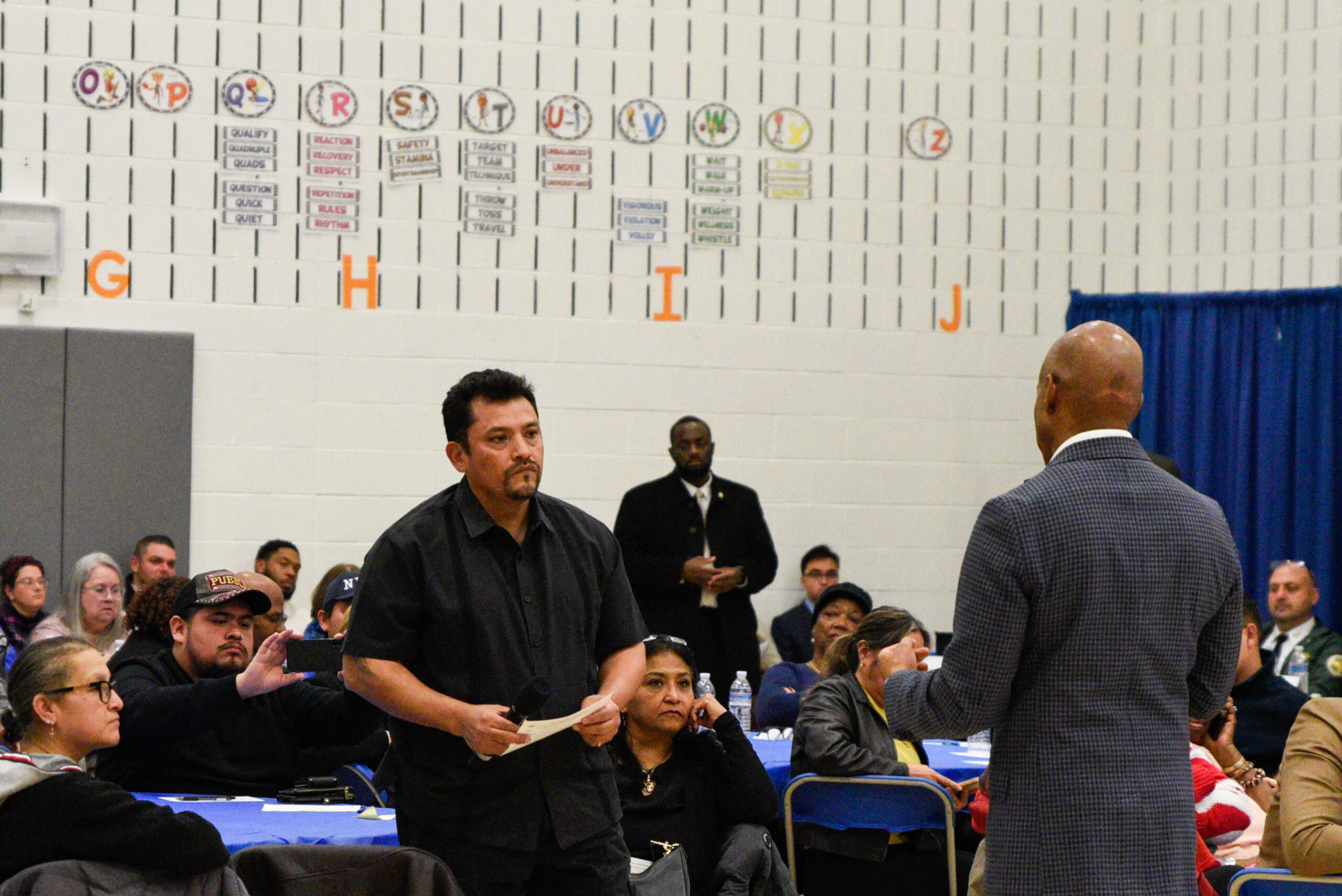
The Vice President of the Corona Plaza Street Vendor Association, Gaston Cortez, thanked the mayor for supporting the new, significantly smaller, market. He then asked about the probability of expanding the number of allowed vendors in the plaza, or to creating other market spaces for vendors in other parts of the city.
The Mayor said he would like to hear Cortez’s ideas on the issue and said that while the city wants to create more jobs, they need to be careful about making sure regulations are followed, particularly with the sale of food. He also mentioned the brick-and-mortar businesses need to be taken into consideration.
The meeting, while providing residents with a platform to voice their concerns, achieved little, according to State Sen. Jessica Ramos, who spoke to QNS following the town hall. Ramos, according to political consultants, may run against the mayor in the next race.
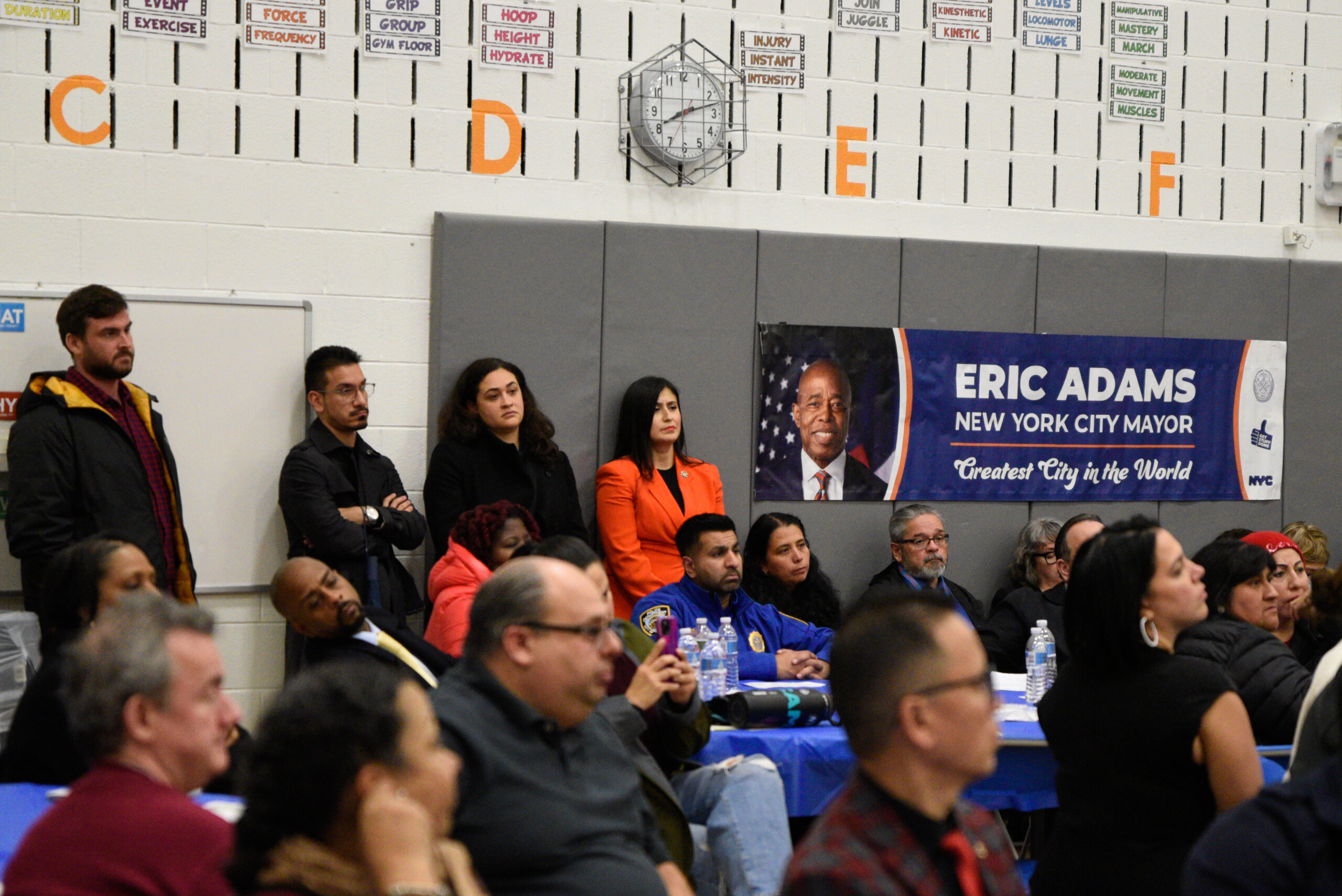
“It was a good opportunity for our neighbors to bring up their issues. And they did. But I think we heard very little about what was actually going to get done. There was a lot of rhetoric. There was a lot of talking about himself,” Ramos said. “Towards the end, a lot of the issues became repetitive, but because of course, they’re the ones that are at the top of everybody’s minds.”


